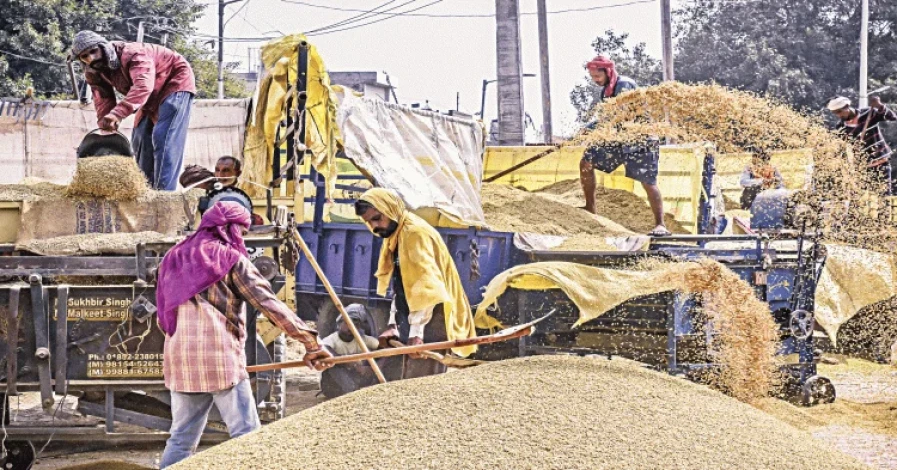
File Photo
With market price ruling high, chances of recovery in purchases are slim, say experts
Rice procurement by the Food Corporation of India (FCI) for the Centre’s buffer stocks in the first three months since the season began on October 1 dropped 14 percent to 299.33 lakh tonnes (lt) from 347.87 lt in the year-ago period. During October-December in 2022, rice procurement was 11 percent higher than the 2021-22 level, experts see the current year’s purchase missing the target by a big margin.
According to the latest data, procurement in Punjab, Haryana and other northern States was completed in December, while in western Uttar Pradesh, it will continue until the end of January. The FCI has managed to buy 125.08 lt in Punjab, which is 2 percent higher from 121.91 lt a year ago and in Haryana it is 39.42 lt against 39.51 lt in 2022-23. The target in Punjab was 122 lt and in Haryana was 40 lt this year.
“The first three months normally show the trend of procurement, unless there is a big change in the harvesting period. In most of the States, the procurement is less and the market price of rice is also high which gives the option to farmers to sell wherever they want,” said an expert. The government could manage to buy around 500 lt from kharif-grown rice out of the total purchase of 568.69 lt in 2022-23.
Chhattisgarh option
However, if the Centre relaxes norms and allows Chhattisgarh’s new government to pay ₹3,100/quintal to paddy farmers against ₹2,203 minimum support price (MSP), there may be some improvement in procurement in the State from now on, the expert said.
The rice procurement in Chhattisgarh has been reported at 38.59 lt until December 31, which is 25 percent lower from 51.61 lt the year ago. Similarly, in Telangana, the rice purchase dipped 28 percent to 27.11 lt from 37.40 lt.
The government has set a target to purchase 521.27 lt of rice from the kharif-grown crop in the 2023-24 season (October-September). The Agriculture Ministry has estimated the kharif rice production to fall by 4 percent to 106.31 million tonnes (mt) in the kharif season from 110.51 mt a year ago.
The fall in procurement or even missing the target may not have a major impact as the government needs 400 lt of rice annually for all its schemes. But lower than expected purchase reduces chances of releasing additional grain more than prescribed by the food security law through the ration shops. During the COVID lockdown, the Centre distributed additional rice and wheat for two years, equal to the amount received by the beneficiaries under NFSA.
Polls slow buys
The FCI has attributed the overall fall in this year’s rice procurement to elections in Chhattisgarh and Telangana and hoped that it will be covered up. But in the past fortnight, the gap in Telangana has further widened while some recovery has been observed in Chhattisgarh.
Rice procurement in Odisha has witnessed some improvements as purchases were lower by 39 percent until December 15, whereas now it is lower by 26 percent. On the other hand, the gap in Andhra Pradesh continues to be over 56 percent. The FCI has been able to buy 8.93 lt in Odisha and 5.07 lt in Andhra Pradesh so far. Exporters are reported to be very active in these two States on political parties’ promises to pay ₹3,100-3,200/quintal during the poll campaign in Chhattisgarh.
The official purchase in Uttar Pradesh has been recorded at 23.05 lt, down by 15 percent from 27.07 lt a year ago. So far, the procurement in the eastern region of the State at 13.80 lt is less than 14.85 lt a year ago, whereas there is a 24 percent dip in the western region at 9.24 lt against 12.21 lt a year ago.
Rice procurement in Tamil Nadu has been nearly constant at 3.7 lt over the past month and is lower by 36 percent against 5.82 lt in the year-ago period. But West Bengal has reported a big surge, due to early harvest, as procurement has reached 3.44 lt so far as against only 86,047 tonnes in the year-ago period.
Source: Online/GFMM
Comment Now